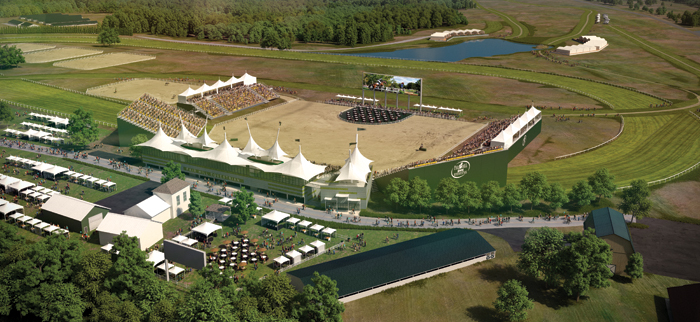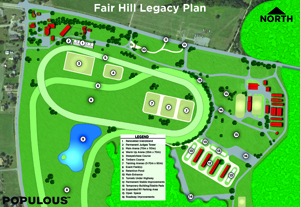A Four Star is Born: International prestige at Fair Hill

Rendering of future accommodations; courtesy of Populous
Once the Federation Equestrian Internationale gives its stamp of approval this fall, one of the world’s great equestrian competitions is going to be calling Maryland—more specifically the 5,600-acre Fair Hill Natural Resource Management Area—its permanent home.

Map rendering; courtesy of Populous
Set to unveil in October 2019, the Fair Hill International Four Star is an arduous annual equine triathlon that takes place over four days. This type of event is so demanding that there are only six other Four Stars in the world and of such magnitude that it is a degree of difficulty higher than the Olympics. The pool of horses and riders that compete are the very best in the world.
Once established, the event could draw as many as 80,000 spectators to Cecil County each fall, provide an estimated $15-30 million economic boost to the region and elevate the State of Maryland into the stratosphere of global equine destinations.
To be named the new home for this prestigious event took an exhaustive bidding procedure conducted by the U.S. Equestrian Federation that lasted for more than a year and involved five of the nation’s finest facilities in four states. Fair Hill was chosen for a combination of culture, history, geography and ideal terrain—a natural surface considered perfect footing for outdoor equestrian events. Its selection positions Maryland and its resurgent horse industry to be a major player in an increasingly competitive equestrian event market.
History
During the first part of the 20th century, William duPont Jr.—a scion of one of America’s wealthiest families from the Wilmington, Delaware area—developed a fierce passion for racehorses and the adventurous sports of foxhunting and steeplechasing.
He started the famed Foxcatcher Racing Stable, quartering his thoroughbreds at his Bellevue estate in Wilmington, and then branching further afield to amass nearly 10,000 acres in Cecil County, Maryland and beyond into Pennsylvania. There he established the Foxcatcher Hounds to accommodate his horses and hounds in a territory similar to the renowned hunting country of the English midlands.
His sister, Marion duPont Scott—who was at one time married to the Hollywood film star, Randolph Scott—started a similar venture in Virginia at Montpelier, once the home of President James Madison.
The bulk of the hunting territory in Maryland came to be known as Fair Hill. In the 1930s, William duPont established both the Cecil County Fair and the Fair Hill steeplechase races. Over the next 40 years, the races and the Foxcatcher Hounds were synonymous with excellence in equestrian sports. At the same time, duPont developed champion racehorses such as the fillies Berlo, Fairy Chant and Parlo, and a colt named Dauber, winner of the 1938 Preakness. He developed several other racecourses as well, including Delaware Park in the nearby Newark area.
After his death in 1965, duPont’s heirs continued running the Fair Hill estate and, along with local equestrian groups, put on carriage drives, foxhunts, horse shows, steeplechase races, three-day events and trail rides.
State purchase
During the 1970s, the Maryland portion of Fair Hill was purchased by the state with the idea of maintaining open space and continuing equestrian pursuits. It was acquired by the Maryland Department of Natural Resources and is managed by the Maryland Park Service.
Considered an equine paradise for nearly a century, Fair Hill is practically ingrained in the DNA of generations of local horsemen and women. Members of the duPont family are still active in many of the activities, as are descendants of the original area families who grew up riding and competing over this treasured land.
The long-established grasslands, rolling hills and wooded coverts prompted the late Col. Donald Walker Thackeray—a Marylander and a high-ranking Equestrian Federation official who officiated at six Olympic Games and judged in four equestrian disciplines—to call Fair Hill “One of the world’s premier sites to host equestrian field events.”
Choosing Fair Hill
It is no wonder then that when the Federation went looking to complement Kentucky’s annual springtime Three Day event by adding another Four Star location in the United States that Fair Hill was in the mix. For nearly 30 years, Fair Hill International has been running a Three Star event and standing as a launching pad for many Olympic-level competitors.
What made applying for the event more prescient, however, is that entrepreneurs, assisted by state and local governments in neighboring states, are investing millions of dollars to build new equestrian centers, while some long-operating facilities in Maryland, like Fair Hill, have been languishing.
There have been examples of local stables and prominent horsemen relocating to places like Tryon in North Carolina and Middleburg in Virginia, and as far afield as Wellington and Ocala in Florida.
Recent studies show that the Maryland equine industry is on the upswing, growing by nearly 25 percent in the past five years. The attrition rate among defecting horsemen has also been kept to a minimum, but if the state is to maintain and grow its industry from its current $1.15 billion annual level of economic activity, then it must address overhauling its major equine competition venues before the drip of defectors becomes a flood.
That is why Fair Hill needs major renovation work at its existing facilities, why gaining the Four Star is so important to the industry’s future, why investors have committed $30 million to improving Laurel Park, and why the 147-year-old Pimlico Race Course in Baltimore is in need of an overhaul.
Maryland pride
Marking a major shift in thinking, horsemen who have long considered Fair Hill “theirs” realize they share this natural paradise with many other environmental and recreation user groups, who greatly add to its upkeep and enjoyment.
Plans for the new Four Star are consolidating activities in a Special Events Zone, and every effort is being made to maintain the pristine beauty of this rural environment. This, after all, is the appeal of the land and what drew William duPont to this area in the first place.
The idea is to make the Fair Hill International Four Star an iconic event all Marylanders will want to see and be proud to call their own.
Article by Ross Peddicord—Horse Industry Board executive director, Maryland Department of Agriculture.
Appears in Vol. 20, No. 4 of the Maryland Natural Resource magazine, fall 2017.


 1-888-373-7888
1-888-373-7888 233733
233733